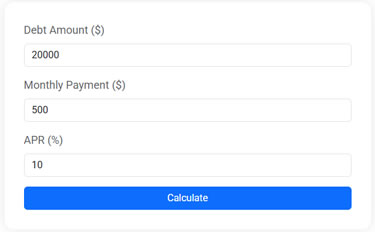Debt Management Mistakes to Avoid at All Costs

Managing debt effectively is vital for financial stability, yet many fall into common traps like ignoring interest rates, paying only the minimum, not budgeting, lacking an emergency fund, and not seeking professional help. Prioritizing high-interest debt, paying more than the minimum, maintaining a budget, and building an emergency fund can help avoid these mistakes. Seeking professional advice when needed is a proactive step towards financial wellness and achieving long-term financial stability.
Managing debt can feel like navigating a maze, where every turn seems to lead to another unexpected challenge. In today's fast-paced world, it's easy to make a misstep that might steer your financial situation into a downward spiral. Whether it's the allure of a low minimum payment or the comforting denial that comes with ignoring interest rates, these common pitfalls can derail even the most well-intentioned efforts to manage debt. It's crucial to understand these mistakes and, more importantly, how to avoid them. Let's dive into some of the most prevalent debt management blunders and explore strategies to steer clear of these financial traps.
Ignoring Interest Rates
Interest rates might seem like just another number on your credit card statement, but they can have a significant impact on your debt repayment plan. Many people overlook the importance of understanding how interest rates work, which can lead to paying significantly more than the original borrowed amount. For instance, carrying a balance on a credit card with an 18% interest rate means that over time, you'll owe much more than you initially charged.
Ignoring these rates is akin to ignoring the speed limit while driving—eventually, it'll catch up with you. To avoid this mistake, it's essential to compare rates across different credit products and prioritize paying off high-interest debt first. According to financial advisor Jane Smith, "Understanding and optimizing interest rates is one of the most effective ways to manage your debt efficiently."
Paying Only the Minimum
The temptation to pay only the minimum amount due on a credit card is strong, especially when finances feel tight. However, this is one of the most detrimental habits you can develop when managing debt. Minimum payments are designed to keep you in debt longer, ensuring the lender profits from extended interest payments.
Consider a credit card bill of $5,000 with an 18% interest rate. Paying only the minimum could take years to erase that debt, with interest costs potentially doubling the initial amount owed. Instead, aim to pay more than the minimum whenever possible. This strategy not only accelerates your debt payoff but also saves you a substantial amount in interest. As CNBC notes, making higher payments can significantly shorten your debt timeline and alleviate financial stress.
Debt Payoff Calculator
Plan your financial future by estimating how long it will take to pay off your debt based on your balance, annual percentage rate (APR), and monthly payment. After entering your figures, the calculator determines the number of months needed to fully repay the debt and calculates the total interest paid over time.
Not Budgeting
Budgeting might sound like a tedious task, but it's a cornerstone of effective debt management. Without a budget, it's easy to lose track of where your money is going each month, leading to overspending and increased debt. Unfortunately, many people underestimate the power of a well-structured budget and the clarity it can bring to their financial situation.
By setting a budget, you can identify areas where you can cut back and allocate more money toward debt repayment. Additionally, a budget helps you prioritize expenses, ensuring that essentials are covered before discretionary spending. A personal anecdote from friend and financial planner Alex Martinez highlights this: "Once I started budgeting, I found an extra $200 each month to put toward my credit card debt, which sped up my repayment significantly."
Lacking an Emergency Fund
Life is full of surprises—some pleasant and others, well, not so much. When unexpected expenses arise, such as a medical bill or car repair, the absence of an emergency fund can lead to increased debt. Many people resort to credit cards to cover these costs, which can exacerbate an already challenging debt situation.
Building an emergency fund acts as a financial cushion, preventing you from relying on credit in times of need. Aim to save three to six months' worth of expenses, gradually building up this fund over time. As personal finance expert Dave Ramsey advises, "An emergency fund is your defense against life's financial curveballs."
Not Seeking Professional Help
There's often a stigma attached to seeking help with financial issues, but consulting a professional can be a game-changer. Many individuals struggle alone with debt management, unaware of the valuable insights and strategies a financial advisor or credit counselor can provide. These experts can help you develop a personalized plan tailored to your financial situation, offering guidance on budgeting, consolidation options, and more.
For example, financial planner Laura Adams shared a success story of a client who managed to reduce their debt by 40% with professional guidance. "Sometimes, an outside perspective is all it takes to turn things around," Adams notes. Don't hesitate to reach out for help—it's a proactive step toward achieving financial stability and wellness.
Conclusion: Steer Your Financial Ship Wisely
Navigating debt doesn't have to be daunting. By recognizing and avoiding these common pitfalls, you can take control of your financial future with confidence. Prioritizing high-interest debt, paying more than the minimum, maintaining a budget, and building an emergency fund are all vital steps toward effective debt management. And remember, seeking professional advice is not a sign of weakness but rather a smart move in the journey toward financial health. With these strategies in your toolkit, you're well-equipped to steer your financial ship in the right direction.








